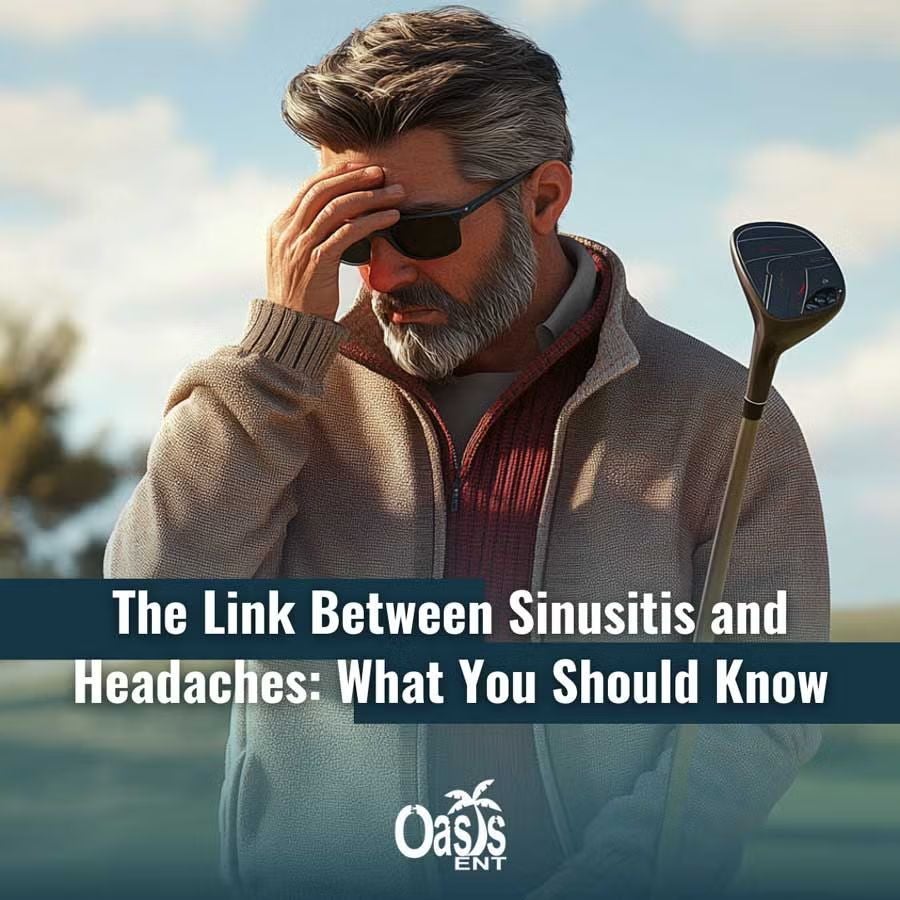The Link Between Sinusitis and Headaches: What You Should Know
Your head feels like it’s caught in a vice grip, and no amount of over-the-counter pain relievers seem to help. That throbbing pain isn’t just a random headache—it could be your sinuses sending out an SOS signal. For millions of people, sinusitis and headaches are more than just separate health issues; they’re a tag team of discomfort that can turn everyday life into a challenge.

What Is Sinusitis?
Sinusitis, often called a sinus infection, happens when the tissue lining your sinuses becomes swollen or inflamed. The sinuses are hollow spaces in your skull that help filter and humidify the air you breathe. When these spaces become blocked due to swelling, mucus builds up, creating the perfect environment for germs to grow.
Sinusitis can be caused by infections, allergies, or even nasal blockages like a deviated septum. It may be acute (lasting less than four weeks) or chronic (lasting longer than 12 weeks, even with treatment).
How Sinusitis Causes Headaches
The connection between sinusitis and headaches lies in the pressure changes and inflammation in your sinuses. When your sinuses are blocked, air and mucus get trapped inside, creating pressure. This pressure can lead to pain that feels like a headache.
Sinus headaches are often mistaken for migraines or tension headaches because the symptoms can overlap. However, there are some key differences:
- Location of Pain: Sinus headaches typically cause pain in your forehead, around your eyes, or in your upper cheeks.
- Worsening Symptoms: Bending over or lying down often makes sinus headaches worse because these positions increase sinus pressure.
- Accompanying Symptoms: Sinusitis-related headaches are usually accompanied by other sinus symptoms like nasal congestion, a runny nose, or facial tenderness.
Recognizing the Signs of a Sinus Headache
It can be tricky to tell if a headache is related to sinusitis, but there are some telltale signs to look for:
- Pressure or pain in the forehead, cheeks, or around the eyes.
- Stuffy or runny nose, often with thick, yellow or green mucus.
- Facial tenderness or swelling.
- Worsening pain when leaning forward or lying down.
- Fatigue or a general feeling of being unwell.
If your headache is accompanied by a fever or lasts more than 10 days without improvement, it’s a good idea to see a doctor.
When It’s Not a Sinus Headache
Not all headaches that occur near the sinuses are caused by sinusitis. Many people mistake migraines for sinus headaches because migraines can also cause facial pain and congestion. However, migraines usually come with additional symptoms like nausea, sensitivity to light or sound, and throbbing pain on one side of the head.
If you’re unsure what’s causing your headaches, a healthcare provider can help identify the root cause and recommend appropriate treatment.
Treatment Options for Sinusitis and Headaches
If your headache is due to sinusitis, treating the underlying sinus issue is the best way to relieve the pain. Here are some common treatment options:
- Hydration and Humidity: Drinking plenty of water and using a humidifier can help thin mucus, making it easier for your sinuses to drain.
- Nasal Irrigation: A saline rinse or neti pot can help flush out mucus and allergens, reducing congestion and pressure.
- Over-the-Counter Medications: Decongestants and pain relievers can provide temporary relief. However, they should not be used for more than a few days without consulting a doctor, as they can cause rebound congestion.
- Prescription Medications: If your sinusitis is caused by a bacterial infection, your doctor may prescribe antibiotics. For chronic sinusitis, they might recommend steroid sprays or allergy medications.
- Lifestyle Changes: Managing allergies, avoiding cigarette smoke, and addressing other irritants can help prevent sinusitis from recurring.
- Surgery: In severe or chronic cases, procedures like balloon sinuplasty or functional endoscopic sinus surgery (FESS) may be needed to open blocked sinuses and restore proper drainage.
When to Seek Help
While many cases of sinusitis resolve on their own or with simple treatments, some require medical attention. You should see a doctor if:
- Your symptoms last more than 10 days without improvement.
- You have a fever over 101°F with facial pain and swelling.
- You experience frequent sinus infections or chronic symptoms.
- Over-the-counter remedies don’t provide relief.
An ear, nose, and throat (ENT) specialist can assess your symptoms, identify the cause of your sinus problems, and recommend the best treatment plan.
Finding Relief and Preventing Recurrence
Sinusitis and its accompanying headaches can be frustrating, but understanding the link between them is the first step toward finding relief. Staying hydrated, managing allergies, and seeking prompt treatment for sinus infections can help keep your sinuses healthy and headache-free.
If sinus headaches are disrupting your daily life, don’t hesitate to reach out to a healthcare provider. With the right care, you can reduce sinus-related headaches and improve your quality of life.
Reclaim Your Comfort and Clarity
Sinus headaches don’t have to be your constant companion. By understanding the connection between your sinuses and head pain, you can take proactive steps towards relief and healing. Knowledge is power, and with the right information and expert guidance, you can break free from the cycle of pain and breathe easier.
If you’re experiencing persistent headaches that seem connected to your sinuses, you don’t have to suffer in silence. Schedule an appointment at Oasis ENT for a comprehensive evaluation and personalized treatment plan that addresses the root of your discomfort.
Disclaimer: This blog is for informational purposes only and should not be considered medical advice. Always consult a licensed healthcare professional regarding any medical condition or treatment.
The information provided in this article is for informational and educational purposes only and does not constitute medical advice. It is not intended to diagnose, treat, cure, or prevent any disease or medical condition. Always seek the guidance of your physician or other qualified healthcare provider with any questions you may have regarding a medical condition or treatment.
Results may vary: Treatment outcomes and health experiences may differ based on individual medical history, condition severity, and response to care.
Emergency Notice: If you are experiencing a medical emergency, call 911 or seek immediate medical attention.


